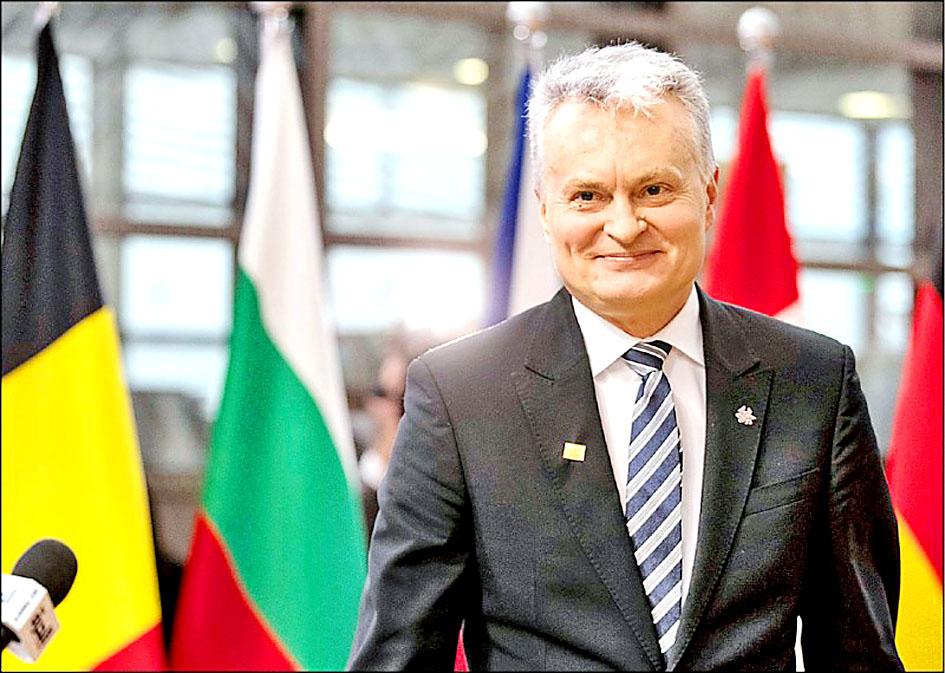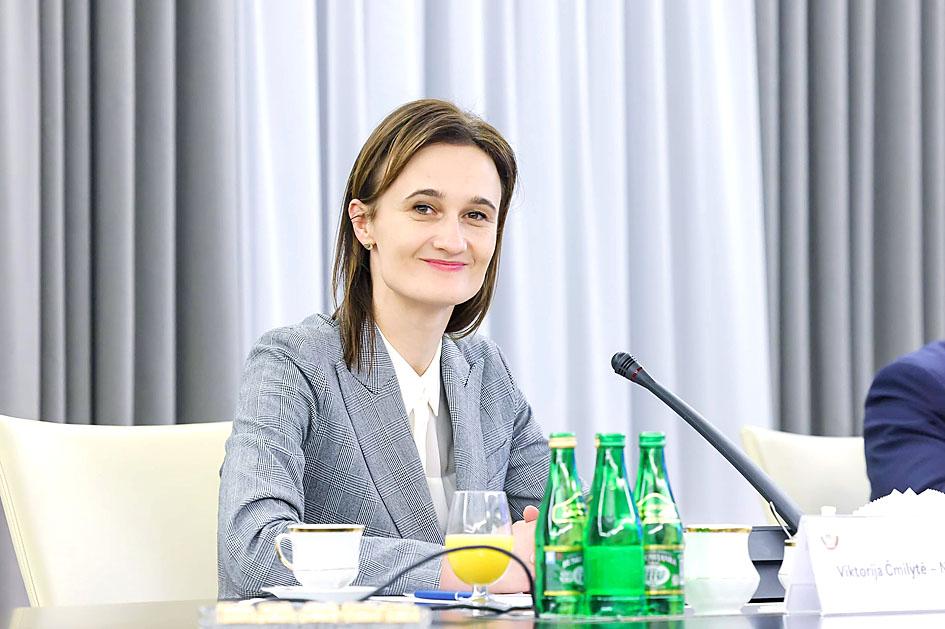Lithuanian President Gitanas Nauseda’s criticism on Tuesday of his country’s decision to allow Taipei to open a representative office in Vilnius using the name “Taiwanese” was a reflection of a domestic power struggle rather than a change in the Baltic state’s Taiwan policy, experts said.
Raigirdas Boruta, an associate expert at the Lithuanian think tank Eastern Europe Studies Centre, said that tense relations between Nauseda and Lithuanian Prime Minister Ingrida Simonyte had continued to heat up since the Cabinet led by Simonyte assumed office in December 2020.
“This recent statement by the president of Lithuania came as a surprise to many people in the country. Since the new Cabinet started its tenure, the Cabinet’s relationship with the president has been quite tense and complicated,” he said.

. Photo: screen grab from Facebook
“Recently, this friction has become more intense as the president is more vocal in his criticism towards the Simonyte government,” with Nauseda often saying he was rarely consulted on the Cabinet’s foreign policy-related decisions, Boruta said.
Marius Laurinavicius, a Lithuania-based expert on Russia, international affairs and security, agreed, saying that given the sensitivity of the cross-strait issue in the Baltic state, it is not unlikely that Nauseda was deliberately bringing up the topic to boost his own popularity.
Laurinavicius said that Nauseda’s remarks were “a very big foreign mistake.”

Photo: screen grab from Twitter
Bringing this ongoing political fight to the world stage would substantially weaken Lithuania’s international position, he added.
In Taipei, Marcin Jerzewski, a Polish research fellow at local think tank Taiwan NextGen Foundation, where he leads the New Southbound Policy research program, said that in the Lithuanian political system, the president is the head of state, and oversees foreign and security policy.
The prime minister, appointed by the president, is the head of government and is responsible for domestic affairs.
However, in practice, the duties of the president and prime minister are somewhat murky, he added.
Nauseda’s comments are not unusual within the context of Lithuania’s semi-presidential democracy, where conflicts between prime ministers and presidents are common.
Nauseda and Simonyte are political opponents and squared off in the second round of Lithuania’s 2019 presidential election, Jerzewski added.
“Ultimately, the reorientation of Vilnius’ China policy is a project of the ruling coalition, which took office a year ago,” while the public remains wary of the actual effects of the diplomatic row, he said.
Consequently, comments about Lithuania backing down from supporting Taiwan are “nugatory,” he said.
Nauseda said during a radio interview on Tuesday that there was nothing wrong with agreeing to the establishment of a Taiwanese office in Vilnius in November, but the problem was the official name — the Taiwanese Representative Office in Lithuania.
“The name of the office became a key factor that now has a very strong impact on our relations with China,” he said in the interview with Ziniu Radijas.
“I believe the name was the spark, and now we have to deal with the consequences,” he added.
Asked if Nauseda’s comments could mean the Lithuanian government might ask the Taiwanese office to change its name, Boruta and Laurinavicius said it was unlikely.
Nauseda’s controversial comments had elevated a domestic argument onto the international stage and was not in the national interests of the Baltic state, Laurinavicius said.
Forcing the Taiwanese office to change its name would not generate any benefits for Lithuania from China, but would only hurt its relations with the US, he added.
Asked to comment on Nauseda’s remarks, the Lithuanian Ministry of Foreign Affairs said it had no comment for the time being.
Representative to Lithuania Eric Huang (黃鈞耀) said his office had so far not been asked by the host country to change its name.
Ministry of Foreign Affairs spokeswoman Joanne Ou (歐江安) on Tuesday said that the ministry had noted Nauseda’s remarks in the interview, but did not wish to comment on the foreign policy of another country.
Taiwan will continue to support Lithuania amid the pressure it has encountered from China on all fronts simply because it allowed the opening of the representative office under the name “Taiwanese,” she added.
Taiwan’s representative offices in other countries with which it does not have official diplomatic relations usually use “Taipei” in their official names.
Beijing has sought to impose a cost on Lithuania for its decision, which it sees as implying Taiwan’s formal independence.
China’s recent retaliatory actions have included recalling its ambassador to Lithuania and expelling the Lithuanian ambassador from Beijing, as well as suspending direct freight train services to the Baltic state and banning Lithuanian products.

Chinese Nationalist Party (KMT) Chairman Eric Chu (朱立倫), spokeswoman Yang Chih-yu (楊智伃) and Legislator Hsieh Lung-chieh (謝龍介) would be summoned by police for questioning for leading an illegal assembly on Thursday evening last week, Minister of the Interior Liu Shyh-fang (劉世芳) said today. The three KMT officials led an assembly outside the Taipei City Prosecutors’ Office, a restricted area where public assembly is not allowed, protesting the questioning of several KMT staff and searches of KMT headquarters and offices in a recall petition forgery case. Chu, Yang and Hsieh are all suspected of contravening the Assembly and Parade Act (集會遊行法) by holding

PRAISE: Japanese visitor Takashi Kubota said the Taiwanese temple architecture images showcased in the AI Art Gallery were the most impressive displays he saw Taiwan does not have an official pavilion at the World Expo in Osaka, Japan, because of its diplomatic predicament, but the government-backed Tech World pavilion is drawing interest with its unique recreations of works by Taiwanese artists. The pavilion features an artificial intelligence (AI)-based art gallery showcasing works of famous Taiwanese artists from the Japanese colonial period using innovative technologies. Among its main simulated displays are Eastern gouache paintings by Chen Chin (陳進), Lin Yu-shan (林玉山) and Kuo Hsueh-hu (郭雪湖), who were the three young Taiwanese painters selected for the East Asian Painting exhibition in 1927. Gouache is a water-based

Taiwan would welcome the return of Honduras as a diplomatic ally if its next president decides to make such a move, Minister of Foreign Affairs Lin Chia-lung (林佳龍) said yesterday. “Of course, we would welcome Honduras if they want to restore diplomatic ties with Taiwan after their elections,” Lin said at a meeting of the legislature’s Foreign Affairs and National Defense Committee, when asked to comment on statements made by two of the three Honduran presidential candidates during the presidential campaign in the Central American country. Taiwan is paying close attention to the region as a whole in the wake of a

OFF-TARGET: More than 30,000 participants were expected to take part in the Games next month, but only 6,550 foreign and 19,400 Taiwanese athletes have registered Taipei city councilors yesterday blasted the organizers of next month’s World Masters Games over sudden timetable and venue changes, which they said have caused thousands of participants to back out of the international sporting event, among other organizational issues. They also cited visa delays and political interference by China as reasons many foreign athletes are requesting refunds for the event, to be held from May 17 to 30. Jointly organized by the Taipei and New Taipei City governments, the games have been rocked by numerous controversies since preparations began in 2020. Taipei City Councilor Lin Yen-feng (林延鳳) said yesterday that new measures by